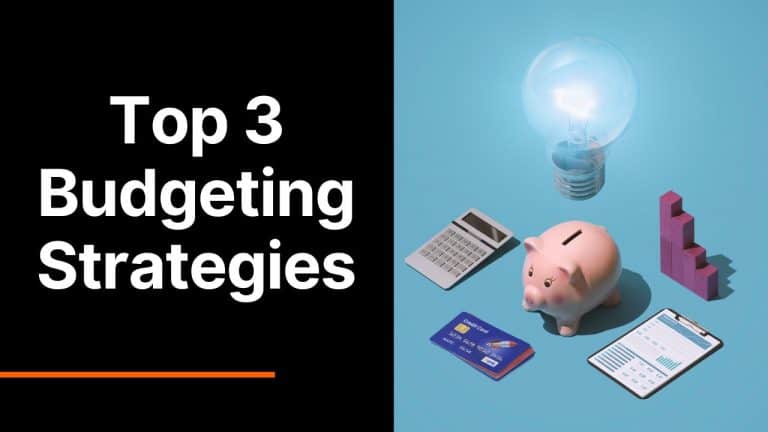Financial Dreams: How to Achieve Them Using Short and Long-Term Goals
We all have financial dreams.
We want to be able to buy a nice home, take luxurious vacations, and save money for retirement. But too often, these dreams seem out of reach.
That’s because we don’t all have a plan to fulfill them.
We need to set both short and long-term financial goals to make our financial dreams a reality.
So, let’s look at how to create short and long-term goals to attain your financial dreams!
Your Financial Dreams and Goals are Far in The Future
We often don’t think about our financial goals and dreams because they’re so far into the future.
This is a problem because if we don’t have a plan or idea of what we want our money to do for us, it’s very easy for life to get in the way.
We might even continue putting our dreams off further and further away.

It’s not that we don’t want them anymore. It’s just now there might be other priorities we prioritize spending money on.
Our dreams become a little less important. Life events completely out of our control happen. And before we know it, they might be forgotten. This is why we need to make some BIG in-your-face goals.
Some goals that’ll make us sit up and take notice. Something we can strive for and fulfill.
No, it doesn’t have to be anything too crazy or unachievable. But it should be something that will get us excited about our financial future.
Why You Need Both Short and Long-Term Financial Goals
It’s easy to get stuck in the details of our lives.
[snippet]We go to work, take care of our families, and have to keep a roof over our heads. It’s hard enough trying to maintain our current lifestyle. And when we’re constantly hit with bills and might not have it, it’s tough to see how we can ever get ahead.[/snippet]
Having both short and long-term goals can help solve this problem.
Because when you have a big goal that’s years away, it can be easy to get discouraged when you don’t see any progress being made.
But if you break down your dream into smaller goals, you can see your progress along the way.
Which should help keep you motivated.
Small goals are also easier to achieve. When you have a big goal that seems impossible, it can be tough to get started. You procrastinate.
But if you have short-term goals leading up to that big goal, it will seem more achievable, and you’re more likely to stick with it.
Short and long-term goals also give you a sense of balance.
You’re not just focused on the future; you’re also working on things here and now in the present. This can help you feel more grounded and less like you’re chasing after something that’s always out of reach.
Financial Security Should Be One of Your Big Goals
In these uncertain times, getting your finances in order is more important than ever. This means saving up for a rainy day and preparing for unexpected
One of the best ways to do this is to set aside some cash each month into an emergency savings account, also known as an emergency fund.
That way, you’ll have a cushion to fall back on if something unexpected arises.
Another good idea is to make a budget that works for you and stick to it. This can help you avoid overspending and going into debt.
And don’t forget to make a savings goal for your retirement.
Saving for retirement gives you financial security after you exit the workforce. So, start saving for financial independence early.
That way, you don’t have to rely on anyone else for your basic needs like water, food, shelter, and so on.
Financial Planning Questions You Should Ask Yourself
A financial plan is a guide that puts you on the path to achieving your goals. But your financial plan is only as good as how accurate and up-to-date it is.
Here are two questions you can ask that’ll help you reach your financial dreams:
- What do you want to accomplish in the next year?
- How much money am I going to save in the next year?
Once you can answer these questions, it’s time to make a 3, 5, and 10-year financial goal based on your answers.

Please write down the answer to these questions, and then outline EXACTLY how you’d it under your answer.
Try and break things down month by month for the first year.
Your monthly breakdown will help you plan your 3, 5, and 10-year goals. Which will help make your goals more concrete and achievable.
You should feel confident in your ability to save money and move towards your goals. This can be done by asking yourself, “does my monthly breakdown map to my long-term goal?”
If the answer is no, you need to revisit your goals and change them until it does.
Your short-term goals should be something you can fulfill in less than a year. And your long-term goal should be something that’ll take more than 5 to 10 years to accomplish.
Knowing What You Want Makes Achieving Financial Success Easier
Part of the reason people have difficulty creating a financial plan is that they don’t know what they want.
So, they keep doing what they’re doing, not really making any progress.
If you take the time to figure out what you want in life, it becomes much easier to use your money to make it come true.
Some people think they’ll be happy if they have a high
You have to have an action plan for your
You must know what you want and don’t want to achieve your financial dreams. So, sit down and really think about it and write it down.
Because figuring out what you want is a huge step in taking control of your money and your life.
Then, once done…
Be Prepared For Things to Change
What you want today might not be what you want a year or six months from now.
So, reviewing your goals and financial dreams regularly is important. You want to make sure they align with what you want. If things have changed, that’s okay. Just adjust your plan and keep going.
The most important thing is that you’re always working towards something. That way, even if your goals change, you’re still making progress, which is what matters most.
And once you understand your situation and financial goals, you can work backward.
Hustle For Your Financial Dreams and Financial Independence
Sitting around won’t make your financial dreams come true.
You must put the work in and hustle to make them a reality because there is no magic formula when it comes to success.
But there are certain things you can do to increase your chances of achieving your financial goals.
Tips That’ll Help You Reach Your Financial Goals:
- Start Small – don’t try to do too much at once
- Be Realistic – know what you can and cannot achieve
- Make Some Bets – with yourself or others to stay motivated
- Set a Timeline – put a date on when you want to achieve your goal
- Be Accountable – have someone else hold you accountable if needed
- Have Fun – the more fun you have, the more likely you are to stick with it
This is as close to magic as it gets to making your financial dreams come true. But remember, dreams only come true if you’re willing to put in the work.
And if you’re committed, creative, and add more value to other people’s lives than anybody else, you can achieve your dreams – Tony Robbins.
Don’t Forget to Celebrate Your Achievements Along The Way
Celebrate when you’ve finally reached a financial goal you’ve been working towards for months, years, or maybe even a decade.
Whether That’s:
- Paying off debt
- Buying a new car with cash
- Saving up for a down payment on a house
- Investing 30% of your
income each month - Making a certain amount of investment
income - Hitting a saving target in your checking account
It feels great to achieve something you’ve been working towards for a while.
For example, if you’re saving up for a down payment on a house, don’t just wait until you have the full amount saved before celebrating.
Instead, celebrate when you hit smaller milestones, like saving up $5,000 or $10,000. Celebrating will help keep you motivated until you reach your final goal.

The same goes for getting out of debt.
If you’re working on paying off a credit card with a balance of $5,000, celebrate when you pay it off, even if you still have other debts to tackle.
Set Goals to Succeed Financially
A lot of people have a dream when it comes to their finances.
Many want to be able to retire early or quit their day job and live off their
Without setting goals, it’s very hard to move forward.
This is why you need to save. So, even if your dream is years away, start stacking now. The more you can put away, the better off you’ll be.
Then, invest!
Stock market
Just remember also to be mindful of your spending.
You can’t reach your financial dreams if you don’t invest in the right things and live below your means.






